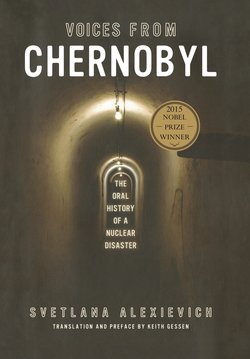Читать книгу Voices from Chernobyl - Светлана Алексиевич - Страница 9
На сайте Литреса книга снята с продажи.
PART ONE THE LAND OF THE DEAD MONOLOGUE ON WHY WE REMEMBER
ОглавлениеYou’ve decided to write about this? About this? But I wouldn’t want people to know this about me, what I went through there. On the one hand, there’s the desire to open up, to say everything, and on the other—I feel like I’m exposing myself, and I wouldn’t want to do that.
Do you remember how it was in Tolstoy? Pierre Bezukhov is so shocked by the war, he thinks that he and the whole world have changed forever. But then some time passes, and he says to himself: “I’m going to keep yelling at the coach-driver just like before, I’m going to keep growling like before.” Then why do people remember? So that they can determine the truth? For fairness? So they can free themselves and forget? Is it because they understand they’re part of a grand event? Or are they looking into the past for cover? And all this despite the fact that memories are very fragile things, ephemeral things, this is not exact knowledge, but a guess that a person makes about himself. It isn’t even knowledge, it’s more like a set of emotions.
My emotions . . . I struggled, I dug into my memory and I remembered.
The scariest thing for me was during my childhood—that was the war.
I remember how we boys played “mom and dad”—we’d take the clothes off the little ones and put them on top of one another. These were the first kids born after the war, because during the war kids were forgotten. We waited for life to appear. We played “mom and dad.” We wanted to see how life would appear. We were eight, ten years old.
I saw a woman trying to kill herself. In the bushes by the river. She had a brick and she was hitting herself in the head with it. She was pregnant from an occupying soldier whom the whole village hated. Also, as a boy, I saw a litter of kittens being born. I helped my mother pull a calf from its mother, I led our pig to meet up with a boar. I remember—I remember how they brought my father’s body, he had on a sweater, my mother had knit it herself, and he’d been shot by a machine gun, and bloody pieces of something were coming out of that sweater. He lay on our only bed, there was nowhere else to put him. Later he was buried in front of the house. And the earth wasn’t cotton, it was heavy clay. From the beds for beetroot. There were battles going on all around. The street was filled with dead people and horses.
For me, those memories are so personal, I’ve never spoken of them out loud.
Back then I thought of death just as I did of birth. I had the same feeling when I saw a calf come out of a cow—and the kittens were born—as when I saw that woman with the brick in the bushes killing herself. For some reason these seemed to me to be the same things—birth and death.
I remember from my childhood how a house smells when a boar is being cut up. You’ve just touched me, and I’m already falling into there, falling—into that nightmare. That terror. I’m flying into it. I also remember how, when we were little, the women would take us with them to the sauna. And we saw that all the women’s uteruses (this we could understand even then) were falling out, they were tying them up with rags. I saw this. They were falling out because of hard labor. There were no men, they were at the front, or with the partisans, there were no horses, the women carried all the loads themselves. They ploughed over the gardens themselves, and the kolkhoz fields. When I was older, and I was intimate with a woman, I would remember this—what I saw in the sauna.
I wanted to forget. Forget everything. And I did forget. I thought the most horrible things had already happened. The war. And that I was protected now, that I was protected.
But then I traveled to the Chernobyl Zone. I’ve been there many times now. And understood how powerless I am. I’m falling apart. My past no longer protects me. There aren’t any answers there. They were there before, but now they’re not. The future is destroying me, not the past.
Pyotr S., psychologist
